Sean Welleck
Reasoning with Latent Tokens in Diffusion Language Models
Feb 03, 2026Abstract:Discrete diffusion models have recently become competitive with autoregressive models for language modeling, even outperforming them on reasoning tasks requiring planning and global coherence, but they require more computation at inference time. We trace this trade-off to a key mechanism: diffusion models are trained to jointly predict a distribution over all unknown tokens, including those that will not actually be decoded in the current step. Ablating this joint prediction yields faster inference but degrades performance, revealing that accurate prediction at the decoded position relies on joint reasoning about the distribution of undecoded tokens. We interpret these as latent tokens and introduce a method for modulating their number, demonstrating empirically that this enables a smooth tradeoff between inference speed and sample quality. Furthermore, we demonstrate that latent tokens can be introduced into autoregressive models through an auxiliary multi-token prediction objective, yielding substantial improvements on the same reasoning tasks where they have traditionally struggled. Our results suggest that latent tokens, while arising naturally in diffusion, represent a general mechanism for improving performance on tasks requiring global coherence or lookahead.
Propose, Solve, Verify: Self-Play Through Formal Verification
Dec 20, 2025



Abstract:Training models through self-play alone (without any human data) has been a longstanding goal in AI, but its effectiveness for training large language models remains unclear, particularly in code generation where rewards based on unit tests are brittle and prone to error propagation. We study self-play in the verified code generation setting, where formal verification provides reliable correctness signals. We introduce Propose, Solve, Verify (PSV) a simple self-play framework where formal verification signals are used to create a proposer capable of generating challenging synthetic problems and a solver trained via expert iteration. We use PSV to train PSV-Verus, which across three benchmarks improves pass@1 by up to 9.6x over inference-only and expert-iteration baselines. We show that performance scales with the number of generated questions and training iterations, and through ablations identify formal verification and difficulty-aware proposal as essential ingredients for successful self-play.
OptimalThinkingBench: Evaluating Over and Underthinking in LLMs
Aug 18, 2025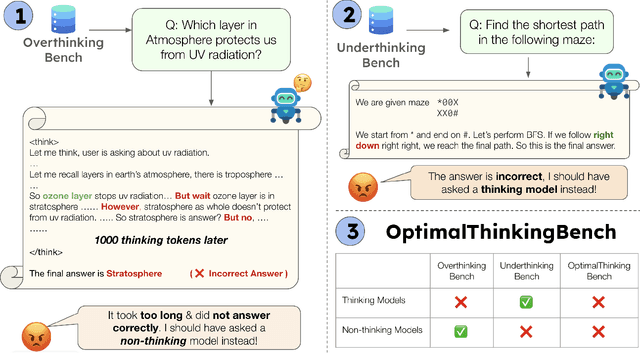
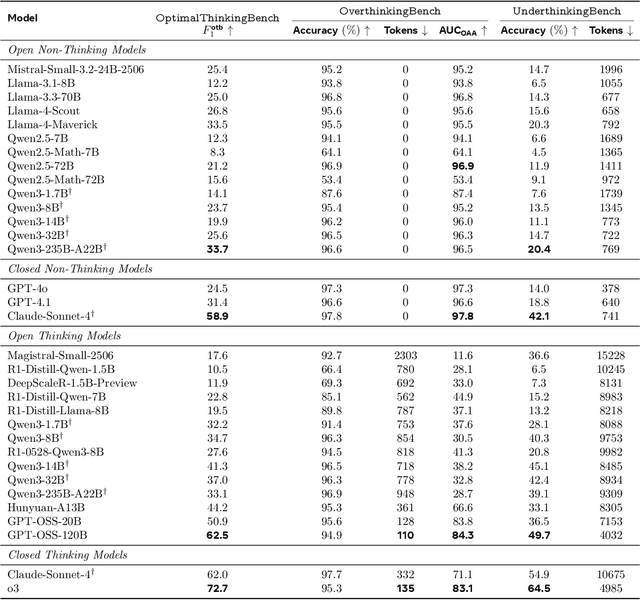

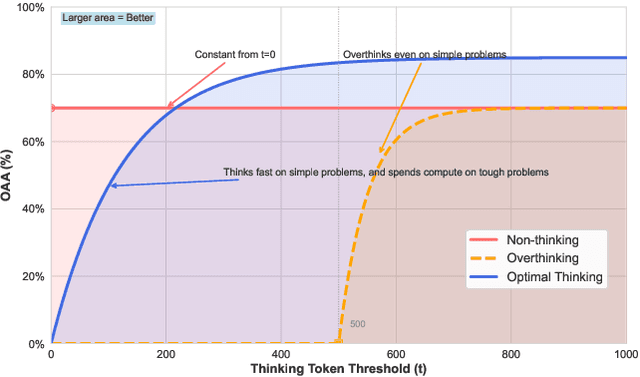
Abstract:Thinking LLMs solve complex tasks at the expense of increased compute and overthinking on simpler problems, while non-thinking LLMs are faster and cheaper but underthink on harder reasoning problems. This has led to the development of separate thinking and non-thinking LLM variants, leaving the onus of selecting the optimal model for each query on the end user. In this work, we introduce OptimalThinkingBench, a unified benchmark that jointly evaluates overthinking and underthinking in LLMs and also encourages the development of optimally-thinking models that balance performance and efficiency. Our benchmark comprises two sub-benchmarks: OverthinkingBench, featuring simple queries in 72 domains, and UnderthinkingBench, containing 11 challenging reasoning tasks. Using novel thinking-adjusted accuracy metrics, we perform extensive evaluation of 33 different thinking and non-thinking models and show that no model is able to optimally think on our benchmark. Thinking models often overthink for hundreds of tokens on the simplest user queries without improving performance. In contrast, large non-thinking models underthink, often falling short of much smaller thinking models. We further explore several methods to encourage optimal thinking, but find that these approaches often improve on one sub-benchmark at the expense of the other, highlighting the need for better unified and optimal models in the future.
Premise Selection for a Lean Hammer
Jun 09, 2025Abstract:Neural methods are transforming automated reasoning for proof assistants, yet integrating these advances into practical verification workflows remains challenging. Hammers are tools that interface with external automatic theorem provers to automate tedious reasoning steps. They have dramatically improved productivity in proof assistants, but the Lean proof assistant still does not have a hammer despite its growing popularity. We present LeanHammer, the first end-to-end domain-general hammer for Lean, built on a novel neural premise selection system for a hammer in dependent type theory. Unlike existing Lean premise selectors, our approach dynamically adapts to user-specific contexts and combines with symbolic proof search and reconstruction to create a practical hammer. With comprehensive evaluations, we show that our premise selector enables LeanHammer to solve 21\% more goals relative to existing premise selectors, and generalize well to diverse domains. Our work bridges the gap between neural retrieval and symbolic reasoning, making formal verification more accessible to researchers and practitioners.
The CoT Encyclopedia: Analyzing, Predicting, and Controlling how a Reasoning Model will Think
May 15, 2025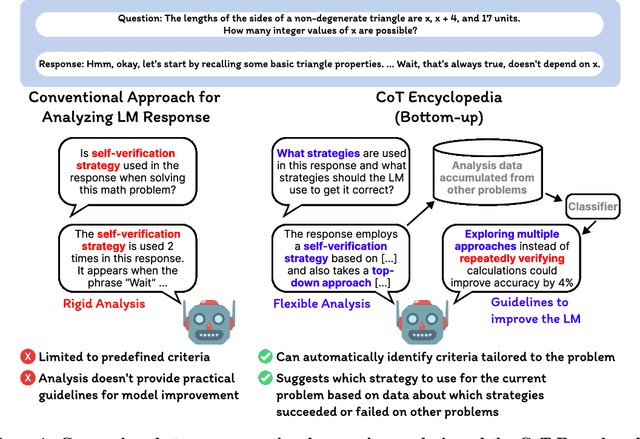
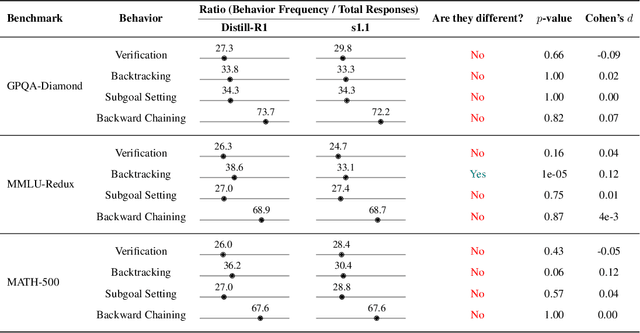
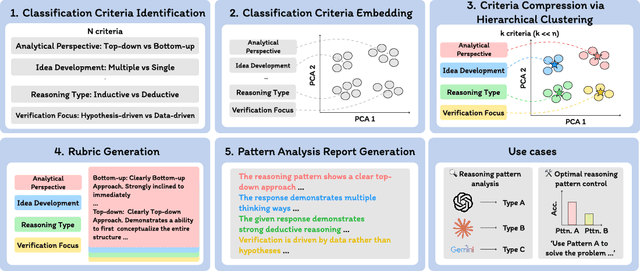
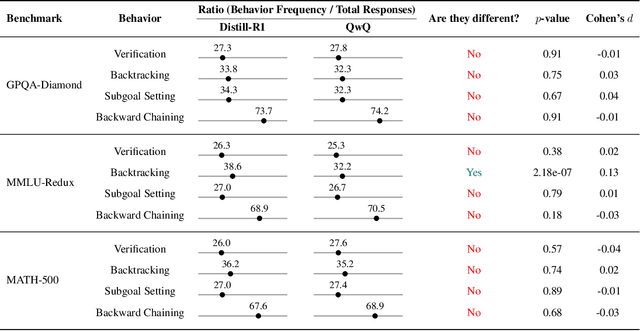
Abstract:Long chain-of-thought (CoT) is an essential ingredient in effective usage of modern large language models, but our understanding of the reasoning strategies underlying these capabilities remains limited. While some prior works have attempted to categorize CoTs using predefined strategy types, such approaches are constrained by human intuition and fail to capture the full diversity of model behaviors. In this work, we introduce the CoT Encyclopedia, a bottom-up framework for analyzing and steering model reasoning. Our method automatically extracts diverse reasoning criteria from model-generated CoTs, embeds them into a semantic space, clusters them into representative categories, and derives contrastive rubrics to interpret reasoning behavior. Human evaluations show that this framework produces more interpretable and comprehensive analyses than existing methods. Moreover, we demonstrate that this understanding enables performance gains: we can predict which strategy a model is likely to use and guide it toward more effective alternatives. Finally, we provide practical insights, such as that training data format (e.g., free-form vs. multiple-choice) has a far greater impact on reasoning behavior than data domain, underscoring the importance of format-aware model design.
Scaling Evaluation-time Compute with Reasoning Models as Process Evaluators
Mar 25, 2025Abstract:As language model (LM) outputs get more and more natural, it is becoming more difficult than ever to evaluate their quality. Simultaneously, increasing LMs' "thinking" time through scaling test-time compute has proven an effective technique to solve challenging problems in domains such as math and code. This raises a natural question: can an LM's evaluation capability also be improved by spending more test-time compute? To answer this, we investigate employing reasoning models-LMs that natively generate long chain-of-thought reasoning-as evaluators. Specifically, we examine methods to leverage more test-time compute by (1) using reasoning models, and (2) prompting these models to evaluate not only the response as a whole (i.e., outcome evaluation) but also assess each step in the response separately (i.e., process evaluation). In experiments, we observe that the evaluator's performance improves monotonically when generating more reasoning tokens, similar to the trends observed in LM-based generation. Furthermore, we use these more accurate evaluators to rerank multiple generations, and demonstrate that spending more compute at evaluation time can be as effective as using more compute at generation time in improving an LM's problem-solving capability.
L1: Controlling How Long A Reasoning Model Thinks With Reinforcement Learning
Mar 06, 2025Abstract:Reasoning language models have shown an uncanny ability to improve performance at test-time by ``thinking longer''-that is, by generating longer chain-of-thought sequences and hence using more compute. However, the length of their chain-of-thought reasoning is not controllable, making it impossible to allocate test-time compute to achieve a desired level of performance. We introduce Length Controlled Policy Optimization (LCPO), a simple reinforcement learning method that optimizes for accuracy and adherence to user-specified length constraints. We use LCPO to train L1, a reasoning language model that produces outputs satisfying a length constraint given in its prompt. L1's length control allows for smoothly trading off computational cost and accuracy on a wide range of tasks, and outperforms the state-of-the-art S1 method for length control. Furthermore, we uncover an unexpected short chain-of-thought capability in models trained with LCPO. For instance, our 1.5B L1 model surpasses GPT-4o at equal reasoning lengths. Overall, LCPO enables precise control over reasoning length, allowing for fine-grained allocation of test-time compute and accuracy. We release code and models at https://www.cmu-l3.github.io/l1
Programming with Pixels: Computer-Use Meets Software Engineering
Feb 24, 2025Abstract:Recent advancements in software engineering (SWE) agents have largely followed a $\textit{tool-based paradigm}$, where agents interact with hand-engineered tool APIs to perform specific tasks. While effective for specialized tasks, these methods fundamentally lack generalization, as they require predefined tools for each task and do not scale across programming languages and domains. We introduce $\texttt{Programming with Pixels}$ (PwP), an agent environment that unifies software development tasks by enabling $\textit{computer-use agents}$-agents that operate directly within an IDE through visual perception, typing, and clicking, rather than relying on predefined tool APIs. To systematically evaluate these agents, we propose $\texttt{PwP-Bench}$, a benchmark that unifies existing SWE benchmarks spanning tasks across multiple programming languages, modalities, and domains under a task-agnostic state and action space. Our experiments demonstrate that general-purpose computer-use agents can approach or even surpass specialized tool-based agents on a variety of SWE tasks without the need for hand-engineered tools. However, our analysis shows that current models suffer from limited visual grounding and fail to exploit many IDE tools that could simplify their tasks. When agents can directly access IDE tools, without visual interaction, they show significant performance improvements, highlighting the untapped potential of leveraging built-in IDE capabilities. Our results establish PwP as a scalable testbed for building and evaluating the next wave of software engineering agents. We release code and data at https://programmingwithpixels.com
Optimizing Temperature for Language Models with Multi-Sample Inference
Feb 07, 2025Abstract:Multi-sample aggregation strategies, such as majority voting and best-of-N sampling, are widely used in contemporary large language models (LLMs) to enhance predictive accuracy across various tasks. A key challenge in this process is temperature selection, which significantly impacts model performance. Existing approaches either rely on a fixed default temperature or require labeled validation data for tuning, which are often scarce and difficult to obtain. This paper addresses the challenge of automatically identifying the (near)-optimal temperature for different LLMs using multi-sample aggregation strategies, without relying on task-specific validation data. We provide a comprehensive analysis of temperature's role in performance optimization, considering variations in model architectures, datasets, task types, model sizes, and predictive accuracy. Furthermore, we propose a novel entropy-based metric for automated temperature optimization, which consistently outperforms fixed-temperature baselines. Additionally, we incorporate a stochastic process model to enhance interpretability, offering deeper insights into the relationship between temperature and model performance.
Data for Mathematical Copilots: Better Ways of Presenting Proofs for Machine Learning
Dec 19, 2024

Abstract:The suite of datasets commonly used to train and evaluate the mathematical capabilities of AI-based mathematical copilots (primarily large language models) exhibit several shortcomings. These limitations include a restricted scope of mathematical complexity, typically not exceeding lower undergraduate-level mathematics, binary rating protocols and other issues, which makes comprehensive proof-based evaluation suites difficult. We systematically explore these limitations and contend that enhancing the capabilities of large language models, or any forthcoming advancements in AI-based mathematical assistants (copilots or "thought partners"), necessitates a paradigm shift in the design of mathematical datasets and the evaluation criteria of mathematical ability: It is necessary to move away from result-based datasets (theorem statement to theorem proof) and convert the rich facets of mathematical research practice to data LLMs can train on. Examples of these are mathematical workflows (sequences of atomic, potentially subfield-dependent tasks that are often performed when creating new mathematics), which are an important part of the proof-discovery process. Additionally, we advocate for mathematical dataset developers to consider the concept of "motivated proof", introduced by G. P\'olya in 1949, which can serve as a blueprint for datasets that offer a better proof learning signal, alleviating some of the mentioned limitations. Lastly, we introduce math datasheets for datasets, extending the general, dataset-agnostic variants of datasheets: We provide a questionnaire designed specifically for math datasets that we urge dataset creators to include with their datasets. This will make creators aware of potential limitations of their datasets while at the same time making it easy for readers to assess it from the point of view of training and evaluating mathematical copilots.
 Add to Chrome
Add to Chrome Add to Firefox
Add to Firefox Add to Edge
Add to Edge